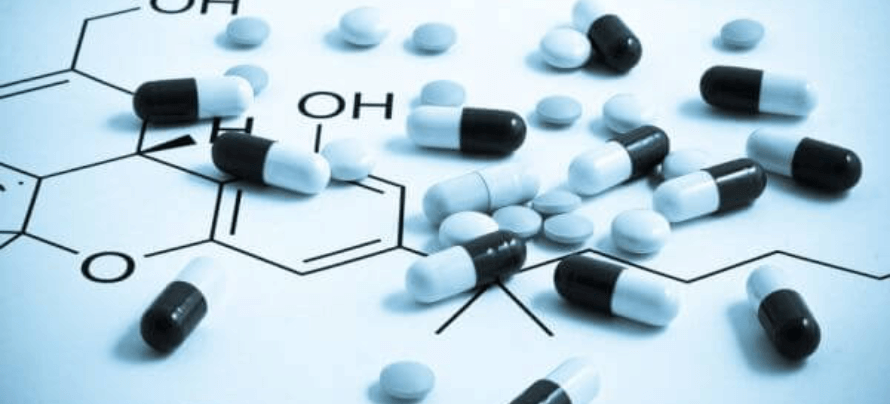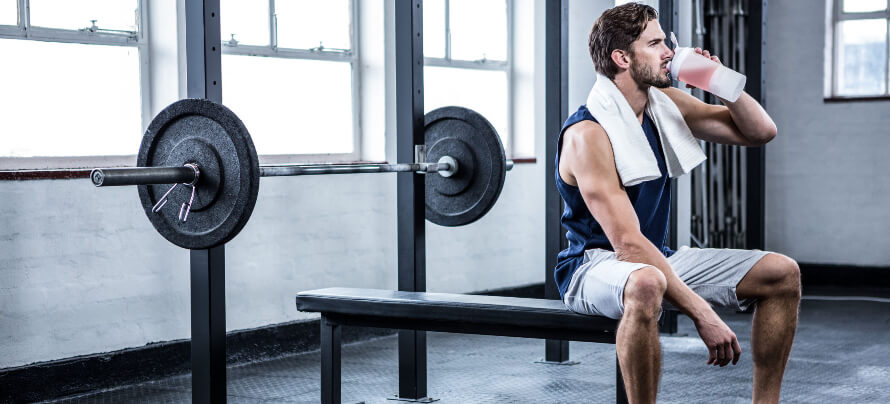Key Takeaways
- Beta-alanine is an amino acid that helps increase your muscle’s carnosine stores, which can reduce fatigue during intense exercise.
- Research shows beta-alanine can improve both weightlifting and endurance performance and increase muscle growth, although it’s most effective for exercise lasting one to four minutes.
- To get the benefits of beta-alanine, you want to consume 4.8 grams per day.
Take this supplement and you’ll be able to train harder.
Train harder and you’ll gain more muscle and strength.
Gain more muscle and strength and you’ll get the body you want faster.
The pitch sounds alluring … and familiar … right?
It’s how pre-workout supplements (among others) are sold, of course.
And these days, many of the most popular pre-workout supplements contain beta-alanine and spotlight it as a key component.
According to their product labels, beta-alanine increases strength, power, and endurance during strength training, sprinting, and most sports.
On the other hand, the skeptics claim that while beta-alanine may help with sports that involve a lot of sprinting, like soccer, football, and basketball, it won’t help you perform better in your strength workouts. Plus, they warn that there aren’t enough studies to prove that beta-alanine is safe.
Who’s right?
The short answer is that beta alanine can help you squeeze out a few more sets and reps in your workouts and it will almost certainly help you perform better in your HIIT workouts, but it probably isn’t going to directly increase your strength.
In this article, you’re going to learn …
- What beta-alanine is
- What the benefits and side effects of beta-alanine are
- How much beta-alanine you have to take to see results
- The best beta-alanine supplements
- And more …
Let’s start at the top.
Table of Contents
+
Want to listen to more stuff like this? Check out my podcast!
What Is Beta Alanine?

Beta-alanine is a nonessential amino acid.
This means it isn’t a necessary part of the human diet because our bodies can create it from other amino acids.
(The amino acids the body can’t create are known as essential amino acids, and they must be obtained through the diet.)
Your body primarily uses beta-alanine to form a compound molecule called carnosine, which is stored in your muscles and brain. It does this by combining beta-alanine with an essential amino acid, L-histidine.
One of carnosine’s roles in our muscles relates to the regulation of acidity levels.
When a muscle contracts repeatedly, it becomes more and more acidic. This, in turn, impairs its ability to continue contracting, until eventually it can no longer contract at all.
This is one of the ways muscles become fatigued.
Carnosine counteracts this by reducing muscle acidity, thereby increasing the amount of work the muscles can do before they become fatigued.
Why Do People Supplement With Beta-Alanine?
There are many ways a muscle can fatigue during a workout.
Increased acidity is a big one, though, and by reducing it you can significantly enhance performance.
Beta-alanine is a popular supplement because it gets converted into carnosine in the body, which then accumulates in the muscles, which reduces acidity.
This, in turn, increases the amount of work they can do before crapping out.
The mechanism whereby beta-alanine enhances performance is similar to that of sodium bicarbonate.
Sodium bicarbonate, commonly known as baking soda, is a powerful base (it has a high Ph), which means it helps counteract the buildup of acid (which has a low Ph) in muscles during exercise.
Beta-alanine beats sodium bicarbonate for practicality though, because it doesn’t upset your stomach and it doesn’t require that you ingest near-dangerous levels to see benefits, which is often the case with sodium bicarbonate.
Now, why not supplement with carnosine directly instead, you wonder?
Because when consumed, carnosine doesn’t make its way to your muscles intact. It gets broken down into its constituent parts, beta-alanine and L-histidine, which then must be reconstituted back into carnosine.
Furthermore, our bodies have plenty of free L-histidine available to create carnosine. What they’re lacking is the extra beta-alanine needed.
And that’s why we supplement with just beta-alanine and not carnosine or beta-alanine and L-histidine separately.
What Are the Benefits of Beta-Alanine?

Beta-alanine’s major benefits lie in improving muscle endurance and possibly body composition as well.
It’s also thought to have some health benefits but the studies are so preliminary at the moment that we’ll leave it as a potential perk that might pan out.
Beta Alanine and Muscle Endurance
In terms of improving endurance, beta-alanine is clearly beneficial but—like all supplements—isn’t a miracle molecule by any stretch of the imagination.
One of the best pieces of evidence in favor of beta-alanine is a meta-analysis conducted by scientists at Nottingham Trent University in 2012.
The scientists combed through 15 placebo controlled, double blinded studies published over the previous six years. In other words, they found and reviewed the cream of the crop when it comes to studies on the performance-enhancing effects of beta-alanine.
Taken together, the studies showed that beta-alanine supplementation resulted in a minor but statistically significant improvement in endurance (2.85%) when the exercise duration was between one to four minutes (the duration you see in supersetting, Crossfit-style workouts, and the like).
Beta-alanine had almost no effect on exercise lasting less than a minute, and tended to improve exercise performance lasting more than four minutes in duration by only a small, statistically insignificant degree.
That is, it’s not particularly helpful with relatively short or long bouts of exercise.
This is why many weightlifters take both beta-alanine and creatine, which notably improves performance in the sub-60-second realm and slightly improves performance in the 60-to-240-second realm.
In this way, they’re “covered” for everything they’re going to be doing in the weight room.
Now, if you’re doing less than 15 or so reps in your sets, it’s unlikely that any of your sets are more than about 30 seconds. So, it would seem that beta-alanine doesn’t have much to offer unless you’re doing supersets, blood-flow restriction training, or the 25+ reps in each set.
Is that the case, though?
That’s what scientists wanted to find out in a study conducted at The College of New Jersey in 2008.
The scientists had eight 20-year old men with at least three years of lifting experience undergo both of the following protocols with four weeks between each:
- Consume 4.8 grams of beta-alanine every day for 30 days.
- Consume a placebo every day for 30 days.
During the study, the subjects lifted weights four times per week, following a traditional legs/back/biceps, and chest/shoulders/triceps routine and doing most of their sets in the 8-to-10-rep range. They also tracked their food intake so the researchers could make sure that both group’s diets were similar.
The researchers tested everyone’s one-rep max and power throughout the study, as well as the average number of reps and pounds lifted in each workout.
When the researchers tallied up the results, they found that taking beta-alanine allowed the subjects to do an average of 22% more reps and lift 18% more total weight in each workout than when they took the placebo.
As you’d expect, beta-alanine didn’t improve their one-rep max or power.
So, it seems that even though these guys were only doing sets that lasted about 30 seconds or less, beta-alanine still helped them do more total volume in their workouts.
Although the researchers didn’t measure muscle growth in this study, it’s quite likely that the athletes taking beta-alanine would have seen better results. As long as you’re using heavy weights and pushing for progressive overload, more volume = more muscle and strength gains.
So that’s weightlifting endurance. What about beta-alanine’s effect on more traditional endurance exercise, like cycling?
To answer that question, scientists from the University of Oklahoma conducted a study where they randomized twenty two, 27-year old women into two groups:
- Group one consumed three to six grams of beta-alanine per day (increasing from three to six grams throughout the study).
- Group two consumed a placebo.
Both groups continued this protocol for 28 days.
Before and after this period, the scientists had the women pedal on an exercise bike while they gradually ratcheted up the intensity until their performance took a nosedive. This is known as a “time-to-exhaustion” test, and it’s a good measure of how long you can maintain high intensity exercise before pooping out.
The researchers found that the women who took beta-alanine could keep cycling 2.5% longer than the women who took the placebo. When they did finally become fatigued, the women who took beta-alanine were also producing about 12.5% more energy.
On the whole, research shows beta-alanine can improve endurance during both weightlifting and cardio, although it’s most effective for exercise lasting one to four minutes.
Beta-Alanine and Muscle Growth

There’s some evidence that beta-alanine may slightly promote muscle growth.
A good example of this is a study conducted by scientists at the University of Oklahoma.
The researchers randomized 45 men into two groups:
- Group one consumed six grams of beta-alanine per day.
- Group two consumed a placebo every day.
Both groups followed this supplementation protocol and did three HIIT workouts per week on an exercise bike for six weeks.
By the end of the study, the beta-alanine group gained about two pounds of lean mass, whereas the placebo group didn’t gain any.
A similar study on women found that beta-alanine also slightly increased lean mass and decreased body fat over four weeks.
Several other studies have shown that even when performance between groups is controlled for (i.e. same amount of work done for each group), beta-alanine supplementation is associated with more muscle growth.
That is, despite following the same types of diets and workout programs, people that supplement with beta-alanine seem to gain more muscle than those that don’t.
This effect doesn’t appear to be merely a byproduct of improved workout performance, either.
We don’t know exactly why just yet, but beta-alanine supplementation appears to directly (albeit slightly) augment muscle growth.
What’s the Clinically Effective Dosage of Beta-Alanine?
Many people say that various supplements are “backed by science,” but what does that mean, really?
Well, it boils down to this:
For a supplement to fully have science on its side, it must be proven effective in well-designed, well-executed, and peer-reviewed scientific research, the dosages that are used in these studies are referred to as the clinically effective dosages.
You see, it’s not enough to just know that beta-alanine can improve performance. You need to know how much is needed to get its benefits.
Well, the amount of beta-alanine used in clinical studies showing benefits ranges from 2.4 to 4.8 grams.
When you look at the data, 2.4 grams is generally sufficient to produce a significant increase in performance, with 4.8 grams sometimes producing marginally better results. Typically, the higher dose is used as a way to make the results as large as possible in clinical research, not because it’s necessary for the average gym goer.
If you’re following a slightly more strenuous workout program than most people, or simply want to be on the safe side, you can take a middle ground dose of 3.6 grams.
That should be more than enough to get the benefits of beta alanine for most people.
Like creatine, beta-alanine also seems to benefit from a “loading phase,” which allows for a faster accumulation of carnosine in the muscles.
In this way, a higher dosage allows you to realize the benefits faster.
It’s also worth noting that it’s generally thought that people doing higher volume weightlifting programs may benefit from the upper end of the clinically effective range of beta-alanine (though 3.6 grams is still sufficient in most cases).
This is because carnosine stores are depleted during muscle contractions so, naturally, the more you contract your muscles (work out), the more carnosine your body “uses.”
Although plausible, this theory hasn’t been demonstrated in scientific research yet.
Oh and in case you’re wondering … beta-alanine doesn’t need to be cycled.
When Should You Take Beta-Alanine?

Beta-alanine is often included in pre-workout supplements, so it may come as a surprise that you don’t need to take it before a workout to get the benefits.
Beta-alanine is similar to creatine in that it’s effects are cumulative in nature. It takes several weeks for it to increase carnosine levels in your muscles enough to improve your performance.
This is why studies in which people take beta-alanine in small doses throughout the day show similar benefits to the studies where people take beta-alanine immediately before their workout.
In other words, as long as you consume the clinically effective dosage every day, it doesn’t matter when you consume beta-alanine.
What Types of Results Should I Expect From Beta-Alanine?
Like all natural supplements, don’t pin unrealistically high expectations on beta-alanine.
Remember that supplements don’t build great physiques—dedication to proper training and nutrition does.
That said, here’s what you can expect from beta-alanine supplementation:
- A slight increase in the amount of volume you’re able to do in your weightlifting workouts.
- A slight increase in the amount of work you’re able to do when supersetting exercises.
- A very slight increase in muscle growth over time (not as noticeable as creatine in this regard).
If that doesn’t sound all that sexy to you, I understand. I’m just calling it like it is.
That said, it doesn’t mean you shouldn’t supplement with beta-alanine. It just means you shouldn’t supplement only with beta-alanine if you really want to see improvements.
The same can be said about most natural supplements.
By themselves, individually, they are underwhelming. Take the right ones together, though, and the cumulative effects can become noticeable.
For example, while beta-alanine may only improve your weightlifting performance by, let’s say, 3%, if you combine it with several other ingredients with similar effects, you could be looking at a 10% boost in your workout performance.
And that’s enough to matter if you also consistently train hard and eat right.
The same goes for fat loss supplements.
While supplements like caffeine, synephrine, and yohimbine are all proven “fat burners,” they’re most effective when combined.
What Causes Beta Alanine Tingling?

About 15 minutes after taking beta-alanine you’ll probably notice a “pins and needles” like itch in your skin.
Usually, this is most noticeable around your face, neck, and arms, but it can also occur elsewhere.
The technical term for this is paresthesia, but most people refer to it as “the tingles” or “beta-alanine tingling.”
Although this can be slightly uncomfortable, it’s entirely harmless.
The reason this occurs is because beta-alanine is also a neurotransmitter and can bind to nerve cells.
One type of nerve cell that’s only found in your skin is particularly sensitive to beta-alanine, and when you consume large amounts, the nerve cells are activated and produce “the tingles” for about 30 to 60 minutes.
This effect decreases after about two weeks, but it rarely goes away entirely.
If you don’t get tingles, that doesn’t necessarily mean the beta-alanine isn’t working.
First, the reaction varies from person to person.
Some people experience mild tingles at around 10 mg per kg of body weight, most people experience moderate tingles at 20 mg/kg, and pretty much everyone will have severe (a bit strong of a word, really, but you get the idea) tingles at 40+ mg/kg.
This means that a smaller dosage of beta-alanine, like 400 to 500 milligrams, is unlikely to cause noticeable tingling.
A larger dosage, though, like 2 to 5 grams, absolutely should (unless you’ve specifically chosen a tablet form of beta-alanine that has a time-release coating).
So if you’re taking a supplement that purportedly contains a large amount of beta-alanine … but you’re not getting any tingles … shenanigans are probably afoot.
If you find yourself in that boat, switch to a new supplement because what you’re taking probably doesn’t have the amount of beta-alanine being claimed (if any at all).
Some people dislike the tingling or are alarmed by it (if they’re not expecting it) but then grow oddly fond of the prickling sensation as time goes on.
*Raises hand.*
If you don’t like the tingles, though, there are three ways you can avoid them:
1. Take take smaller doses throughout the day, instead of one large dose.
For example, instead of consuming 4.8 grams at once, you could consume 1.2 grams in four doses several hours apart throughout the day. (This is often what researchers do in studies so that people don’t realize they’re taking beta-alanine.)
2.Take a beta-alanine supplement that has a time-release coating.
Some beta-alanine supplements are contained in capsules that dissolve slowly, which can completely eliminate the tingles. This form is also more expensive, though, and usually isn’t used in pre-workout supplements.
3. Take beta-alanine with food.
Similar to time-release capsules, this slows down the absorption of beta-alanine and prevents blood levels from rising high enough to irritate your nerves.
One thing to remember: if you stop feeling the tingles or they wear off before you hit the gym, you’re still getting the benefits—it’s not like caffeine where the effects wear off after a few hours.
Does Beta-Alanine Have Any Side Effects?
Aside from the tingles, there are no other known side effects of beta-alanine, but there is one thing that should be noted.
Beta-alanine is transported into cells by the same protein as the amino acid taurine. In a way, these two amino acids “compete” for uptake into cells.
Theoretically, then, too much beta-alanine in your body could inhibit the availability of taurine. When we look at the research on the standard clinically effective dosages given above, though, it doesn’t seem to result in any meaningful loss of intracellular taurine.
What this does indicate, though, is that it’s probably not a good idea to take several large doses of beta-alanine every day.
I’ve seen anecdotal accounts of Olympic weightlifters that did this and suffered from severe muscle cramping, which is a side effect of taurine depletion. On the other hand, cramps can be caused by any number of other things.
Stick with a daily beta-alanine intake of 2 to 5 grams you’ll be fine.
And if you do happen to notice any muscle cramping after starting beta-alanine supplementation, you can reduce the dosage or add taurine to your regimen.
For this purpose, 1 to 2 grams of taurine per day is sufficient.
The Best Beta-Alanine Supplements

As you probably know, beta-alanine is mostly found in pre-workout supplements.
You now know why.
Remember, though …
1. If a supplement contains less than two grams of beta-alanine per serving (and calls for one serving per day), don’t buy it.
It’s underdosed. You want to see two to five grams and the closer to five grams, the better.
2. If a supplement claims to contain a clinically effective dosage of beta-alanine but it doesn’t give you any tingles, switch to something else.
It probably doesn’t have as much beta-alanine as the company is claiming or has a cheap, low quality beta-alanine. (We get contacted by raw ingredient suppliers all the time that could dramatically increase our margins if we didn’t care about the quality of our products.)
By this point you’re probably not surprised to learn that my pre-workout supplement Pulse contains a clinically effective dosage of 4.8 grams of beta-alanine per serving. (This is the case for both regular and caffeine-free Pulse.)
It also contains clinically effective dosages of five other performance-enhancing ingredients:
- Caffeine. Caffeine is good for more than the energy boost. It also increases muscle endurance and strength.
- Citrulline Malate. Citrulline is an amino acid that improves muscle endurance, relieves muscle soreness, and improves aerobic performance.
- Betaine. Betaine is a compound found in plants like beets that improves muscle endurance, increases strength, and increases human growth hormone and insulin-like growth factor 1 production in response to acute exercise.
- Ornithine. Ornithine is an amino acid found in high amounts in dairy and meat that reduces fatigue in prolonged exercise and promotes lipid oxidation (the burning of fat for energy as opposed to carbohydrate or glycogen).
- Theanine. Theanine is an amino acid found primarily in tea that reduces the effects of mental and physical stress, increases the production of nitric oxide, which improves blood flow, and improves alertness, focus, attention, memory, mental task performance, and mood.
And what you won’t find in Pulse is equally special:
- No artificial sweeteners or flavors.
- No artificial food dyes.
- No unnecessary fillers, carbohydrate powders, or junk ingredients.
The bottom line is if you want to know what a pre-workout is supposed to feel like … if you want to experience the type of energy rush and performance boost that only clinically effective dosages of scientifically validated ingredients can deliver … then you want to try Pulse.
The Bottom Line on Beta-Alanine
Beta-alanine is an amino acid that helps increase carnosine levels in your muscles.
Carnosine helps prevent your muscles from becoming overly acidic during intense exercise, which reduces fatigue and boosts performance.
Beta-alanine works best for intense exercise lasting one to four minutes—like high-intensity interval training—but it also seems to boost weightlifting performance during efforts that last closer to 30 seconds. It also seems to slightly increase muscle growth.
The only common side effect of beta-alanine supplementation is a temporary tingling sensation in the skin about 15 minutes after consumption. This is caused by beta-alanine’s affect on a specific type of nerve cell in your skin, and it’s entirely harmless.
For all of these reasons, beta-alanine a worthwhile addition to your supplementation regimen (another perk: beta-alanine isn’t terribly expensive, either).
If you’re going to supplement with beta-alanine, I recommend you combine it with other proven performance enhancers like creatine, citrulline, and betaine.
While you may not notice much of a difference in your workouts when taken individually, the cumulative effects of these supplements can be substantial.
And if you’re looking for a pre-workout supplement that contains a clinically effective dosage of beta-alanine, citrulline, betaine, and three other ingredients proven to enhance physical performance, then you want to try Pulse today.
What’s your take on beta-alanine? Have anything else to share? Let me know in the comments below!
Scientific References +
- Décombaz, J., Beaumont, M., Vuichoud, J., Bouisset, F., & Stellingwerff, T. (2012). Effect of slow-release β-alanine tablets on absorption kinetics and paresthesia. Amino Acids, 43(1), 67–76. https://doi.org/10.1007/s00726-011-1169-7
- Harris, R. C., Tallon, M. J., Dunnett, M., Boobis, L., Coakley, J., Kim, H. J., Fallowfield, J. L., Hill, C. A., Sale, C., & Wise, J. A. (2006). The absorption of orally supplied β-alanine and its effect on muscle carnosine synthesis in human vastus lateralis. Amino Acids, 30(3 SPEC. ISS.), 279–289. https://doi.org/10.1007/s00726-006-0299-9
- Liu, Q., Sikand, P., Ma, C., Tang, Z., Han, L., Li, Z., Sun, S., LaMotte, R. H., & Dong, X. (2012). Mechanisms of itch evoked by β-alanine. Journal of Neuroscience, 32(42), 14532–14537. https://doi.org/10.1523/JNEUROSCI.3509-12.2012
- Tiedje, K. E., Stevens, K., Barnes, S., & Weaver, D. F. (2010). β-Alanine as a small molecule neurotransmitter. In Neurochemistry International (Vol. 57, Issue 3, pp. 177–188). Neurochem Int. https://doi.org/10.1016/j.neuint.2010.06.001
- Harris, R. C., Tallon, M. J., Dunnett, M., Boobis, L., Coakley, J., Kim, H. J., Fallowfield, J. L., Hill, C. A., Sale, C., & Wise, J. A. (2006). The absorption of orally supplied β-alanine and its effect on muscle carnosine synthesis in human vastus lateralis. Amino Acids, 30(3 SPEC. ISS.), 279–289. https://doi.org/10.1007/s00726-006-0299-9
- Glenn, J. M., Smith, K., Moyen, N. E., Binns, A., & Gray, M. (2015). Effects of acute beta-alanine supplementation on anaerobic performance in trained female cyclists. Journal of Nutritional Science and Vitaminology, 61(2), 161–166. https://doi.org/10.3177/jnsv.61.161
- Walter, A. A., Smith, A. E., Kendall, K. L., Stout, J. R., & Cramer, J. T. (2010). Six weeks of high-intensity interval training with and without β-alanine supplementation for improving cardiovascular fitness in women. Journal of Strength and Conditioning Research, 24(5), 1199–1207. https://doi.org/10.1519/JSC.0b013e3181d82f8b
- Kresta, J. Y., Oliver, J. M., Jagim, A. R., Fluckey, J., Riechman, S., Kelly, K., Meininger, C., Mertens-Talcott, S. U., Rasmussen, C., & Kreider, R. B. (2014). Effects of 28 days of beta-alanine and creatine supplementation on muscle carnosine, body composition and exercise performance in recreationally active females. Journal of the International Society of Sports Nutrition, 11(1). https://doi.org/10.1186/s12970-014-0055-6
- Smith, A. E., Walter, A. A., Graef, J. L., Kendall, K. L., Moon, J. R., Lockwood, C. M., Fukuda, D. H., Beck, T. W., Cramer, J. T., & Stout, J. R. (2009). Effects of β-alanine supplementation and high-intensity interval training on endurance performance and body composition in men; a double-blind trial. Journal of the International Society of Sports Nutrition, 6. https://doi.org/10.1186/1550-2783-6-5
- Stout, J. R., Cramer, J. T., Zoeller, R. F., Torok, D., Costa, P., Hoffman, J. R., Harris, R. C., & O’Kroy, J. (2007). Effects of β-alanine supplementation on the onset of neuromuscular fatigue and ventilatory threshold in women. Amino Acids, 32(3), 381–386. https://doi.org/10.1007/s00726-006-0474-z
- Hoffman, J., Ratamess, N. A., Ross, R., Kang, J., Magrelli, J., Neese, K., Faigenbaum, A. D., & Wise, J. A. (2008). β-alanine and the hormonal response to exercise. International Journal of Sports Medicine, 29(12), 952–958. https://doi.org/10.1055/s-2008-1038678
- Hobson, R. M., Saunders, B., Ball, G., Harris, R. C., & Sale, C. (2012). Effects of β-alanine supplementation on exercise performance: A meta-analysis. In Amino Acids (Vol. 43, Issue 1, pp. 25–37). Amino Acids. https://doi.org/10.1007/s00726-011-1200-z
- Gardner, M. L., Illingworth, K. M., Kelleher, J., & Wood, D. (1991). Intestinal absorption of the intact peptide carnosine in man, and comparison with intestinal permeability to lactulose. The Journal of Physiology, 439(1), 411–422. https://doi.org/10.1113/jphysiol.1991.sp018673
- McNaughton, L. R., Siegler, J., & Midgley, A. (2008). Ergogenic effects of sodium bicarbonate. In Current Sports Medicine Reports (Vol. 7, Issue 4, pp. 230–236). Curr Sports Med Rep. https://doi.org/10.1249/JSR.0b013e31817ef530
- Hoffman, J. R., Landau, G., Stout, J. R., Hoffman, M. W., Shavit, N., Rosen, P., Moran, D. S., Fukuda, D. H., Shelef, I., Carmom, E., & Ostfeld, I. (2015). β-Alanine ingestion increases muscle carnosine content and combat specific performance in soldiers. Amino Acids, 47(3), 627–636. https://doi.org/10.1007/s00726-014-1896-7
- Ament, W., & Verkerke, G. (2009). Exercise and fatigue. In Sports Medicine (Vol. 39, Issue 5, pp. 389–422). Sports Med. https://doi.org/10.2165/00007256-200939050-00005
- Green, H. J. (1997). Mechanisms of muscle fatigue in intense exercise. In Journal of Sports Sciences (Vol. 15, Issue 3, pp. 247–256). J Sports Sci. https://doi.org/10.1080/026404197367254










